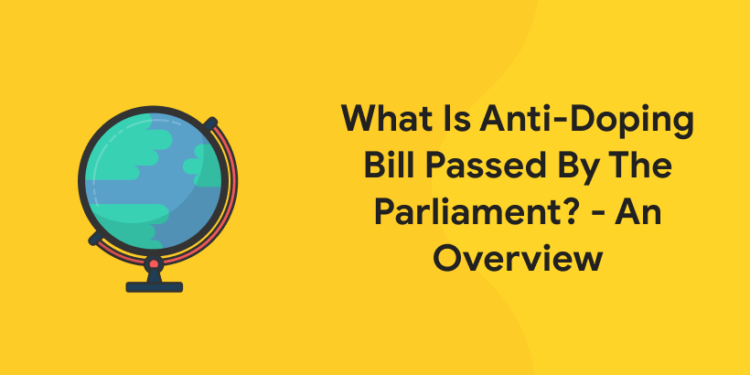Table of Contents
The National Anti-Doping Agency (NADA) is the national organisation which is responsible for promoting, coordinating, and monitoring the doping control program in sports in all its forms in India. As recorded on its official web portal, NADA manages with adopting and implementing anti-doping rules and policies which follow with the World Anti-Doping Agency, cooperates with other anti-doping organisations and stimulates anti-doping research and education.
NADA is formulated by the Union Government under the societies Registration Act. NADA comprises of scientists and representatives from the Indian Olympic Association (IOA). Anti-Doping Bill passed by Rajya Sabha on 3rd August 2022. National Anti-Doping Agency is the statutory body of the bill directed by the Director General appointed by the government.
Attempt Free GK Test! Download Entri App!
National Anti-Doping Organizations (NADOs) are organizations appointed, by their country or government, as the primary authority, at the national level, for the anti-doping programs in a country. This includes:
- Adopting and implementing anti-doping rules.
- Planning and implementing anti-doping education.
- Directing the collection of samples including training sample collection personnel.
- Conducting investigations.
- Managing test results.
- Conducting result management at the national level.
What is the Anti-doping bill?
The Anti-doping bill restrains athletes and other persons related to sports from involving in doping. The Rajya Sabha passed the bill on 3rd August 2022. If any breach is found against the Anti-doping rules, then it may lead to disqualification of the specific person and they may have to face serious consequences like ineligibility to participate in a competition or event for a specific period. The Anti-doping rules are executed by the National Anti-Doping Agency (NADA). NADA will be the statutory body for the bill and will be lead by a Directed General appointed by the central government.
Attempt Free GK Test! Download Entri App!
The bill, however, doesn’t mention any qualification for the Director General of NADA. The bill specifies that the central government has the power to remove the Director General from office on the basis of misbehavior or incapacity or other reasons. The bill has also specified that the Board has the authority to remove the members of the Disciplinary Panel and Appeal Panel on reasons that will be mentioned by the regulations and are not mentioned in the Bill.
Grab Latest Study Materials! Register Here!
Anti-doping Bill: Key Features
1: Who was the first woman President of India?
2: Which of the following is the longest river in India?
3: Who is known as the ‘Missile Man of India’?
4: What is the capital of Arunachal Pradesh?
5: Who among the following wrote the book ‘Discovery of India’?
Ready to see how much you know? Take the challenge!
The usage of a prohibited substance by any athletes during sports events to boost their performance is called Doping. The Anti-Doping bill gives the following key features.
| Key Features | Explanation | Parts |
| Prohibition of Doping | The bill prohibits athletes, athlete personnel, and other related people from engaging in doping in sports. The support personnel includes coaches, managers, team staff, medical personnel, trainer, and others related to or working with the athlete during sports.
|
Following rules must be followed
|
| Consequences of Violations | The consequences of violation of the Anti-Doping rule will be tough for the athletes as it will halt their career for a particular period and it will affect their growth in spots. After a hearing from the National Anti-Doping Disciplinary Panel, the consequences for a violation will be determined. | Consequences
|
| National Anti-Doping Agency | National Anti-Doping Agency which is an established society will implement the Anti-Doping rules. The bill mentions National Anti-Doping Agency as the statutory body, headed by Director General appointed by the central government. | Functions of the agency
|
| Data related to athletes and Doping | The bill allows the National Anti-Doping Agency to collect personal information of the athletes, athlete personnel, and other people. If the athlete violates the Anti-doping rule, the agency has the right to disclose the name of the athlete publicly along with rules violated and consequences imposed. | Personal Data
|
| National Board for Anti-Doping in Sports | The National Board for Anti-Doping in sports will be established to recommend the government in Anti-Doping regulation and compliance with international commitments on Anti-Doping. | – |
| Disciplinary and Appeal Panels | The Disciplinary and Appeal Panel will determine the consequence of the violation of Anti-Doping rules. The panel will be headed by a chairperson, four Vice-chairperson, and ten members. | – |
| National Anti-Doping Appeal Panel | National Anti-Doping Appeal Panel will hear the appeals. | – |
| Doping Test Laboratories | Doping Tests will be determined by the National Dope Testing Laboratory. The central government is going to establish more National Dope Testing Laboratories. | – |
Context:
- The parliament passed the National Anti-Doping Bill collectively on Wednesday by a voice vote.
- The Bill targets to provide a statutory framework for the functioning of the National Anti-Doping Agency (NADA) and the National Dope Testing Laboratory in sports.
- The Minister of Youth Affairs and Sports said India will now join the league of nations like the US, China, France or Australia, Japan, S Korea to have a law and dope test laboratory.
Free UPSKILLING Courses!
Take your first step toward mastering in-demand skills, acing interviews, and securing top-tier jobs with Entri's free upskilling courses.
Start Learning!Key provisions of National Anti-Doping Bill:
- Prohibits athletes from engaging in doping: The legislation restrains athletes, athlete support personnel, and other persons from involving in doping in sports.
- Powers to NADA: The bill will provide NADA powers of, “investigation, levying sanctions for anti-doping rule violations, the disciplinary procedures to be embraced and the powers of inspection, sample collection and sharing and free flow of information”.
- Disqualification for violating rules: In case of violation of doping rules, the athlete will be eliminated.
- Besides loss of medals, points, and prizes, ineligibility to participate in a competition or event for a specific period, and financial sanctions are the actions the violator will have to encounter.
- Planning, monitoring and implementing anti-doping rules: The bill gives for planning, carrying out, and observing anti-doping activities as well as investigating anti-doping rule violations.
- In consonance with UNESCO Convention on doping: It also looks to give effect to the United Nations Educational, Scientific and Cultural Organization International Convention against doping in sports and agreement with such other obligations and commitments.
Grab Latest Study Materials! Register Here!
Issues with the Bill:
- Qualification of Director General: The qualifications of the Director General are not mentioned in the Bill and are left to be informed through Rules.
- Removal of Director General: The central government may remove the Director General from the office on grounds of misbehavior or incapacity or “such other ground”.
- Leaving these provisions to the discretion of the central government may affect the independence of the Director General.
- Against the mandate of WADA: This also goes against the mandate of the World Anti-Doping Agency that such bodies must be independent in their operations.
- Powers of board: Under the Bill, the Board has powers to remove the members of the Disciplinary Panel and Appeal Panel on grounds which will be specified by regulations and are not specified in the Bill.
- No requirement of opportunity to be heard: Further, there is no requirement to give them an opportunity of being heard. This may affect the independent functioning of these panels.
National Anti-Doping Agency (NADA):
- It was set up as a registered society under the Societies Registration Act of 1860 on 24th November, 2005 with a mandate for Dope free sports in India.
- The primary objectives are to implement anti-doping rules as per WADA (World Anti-Doping Agency) code, regulate dope control programmes, to promote education and research and create awareness about doping and its ill effects.
- The NADA has the necessary authority and responsibility for:
- Planning, coordinating, implementing, monitoring and advocating improvements in Doping Control.
- Cooperating with other relevant national organizations, agencies and other Anti-Doping Organizations etc.
World Anti-Doping Agency (WADA):
- It was set up in November, 1999 and was set up under the International Olympic Committee.
- WADA is recognised by the UNESCO International Convention against Doping in Sport (2005).
- WADA’s primary role is to develop, harmonize, and coordinate anti-doping regulations across all sports and countries.
- It does so by ensuring proper implementation of the World Anti-Doping Code (WADA Code) and its standards, conducting investigations into doping incidents, conducting research on doping, and educating sportspersons and related personnel on anti-doping regulations.
Free UPSKILLING Courses!
Take your first step toward mastering in-demand skills, acing interviews, and securing top-tier jobs with Entri's free upskilling courses.
Start Learning!FAQs related to National Anti-Doping Agency
1. What is the National Anti-Doping Bill 2021?
Ans. The government of India has introduced the National Anti-Doping Bill in Rajya Sabha. It allows the National Anti-Doping Agency to conduct raids, investigate and levy sanctions for the violation of Anti-Doping rules.
2. What is the aim of Doping in sports?
Ans. Doping any substance in sports will increase the ability to perform. Doping can increase muscle mass, help in gaining energy, and reduces recovery time.
3. What is the full form of WADA?
Ans. WADA stands for World Anti-Doping Agency, which was set up in 1999, under the International Olympics Committee.
Parliament on Wednesday passed a bill which seeks to provide a statutory framework for the functioning of the National Anti-Doping Agency and the National Dope Testing Laboratory. The National Anti-Doping Bill, 2022 was passed by a voice vote in Rajya Sabha. It was cleared by Lok Sabha last week along with certain official amendments.
Sports and Youth Affairs Minister Anurag Thakur while responding to debate on the bill said that currently India can carry out only about 6,000 tests a year, and the law would help in increasing the testing capacity significantly.
He said for holding any large international championship, the number of tests required could be as high as 10,000 a month.Thakur also said that with passage of this bill, India will join the club select countries like, the US, China, Japan, and France, which have their own laws related to check doping in sports.
Several amendments moved by the Opposition were negated.
The bill is intended to provide a “statutory framework for the operation of the National Anti-Doping Agency (NADA), the National Dope Testing Laboratory (NDTL) and other dope testing laboratories, and for the creation of a National Board for Anti-Doping in Sports to strengthen anti-doping activities in sport”.
It seeks to give NADA powers of “investigation, levying sanctions for anti-doping rule violations, the disciplinary procedures to be adopted and the powers of inspection, sample collection and sharing and free flow of information.”
It also provides for the establishment of the NDTL and other dope testing laboratories.
In countries that do not have a NADO, the National Olympic Committee (NOC) assumes the anti-doping responsibilities for the country. In some regions, there is a need to share anti-doping knowledge and expertise. Regional Anti-Doping Organizations (RADOs) fulfill this role.
The main theme to pass an exam lies in systematic and planned preparation. If you are a candidate who wants to chase your dream career and focusing for a good foundation, Entri App has got it covered for you. Entri App offers a great online platform for all those willing to attend for different bank exams, government exams and other competitive exams. Our team of experts offer short and precise video classes which assists you in learning the concepts. Users get access to flash cards and quizzes and can attempt unlimited mock exams with the same pattern as that of the real exams. We also provide PDFs of previous years’ question papers with solutions.













